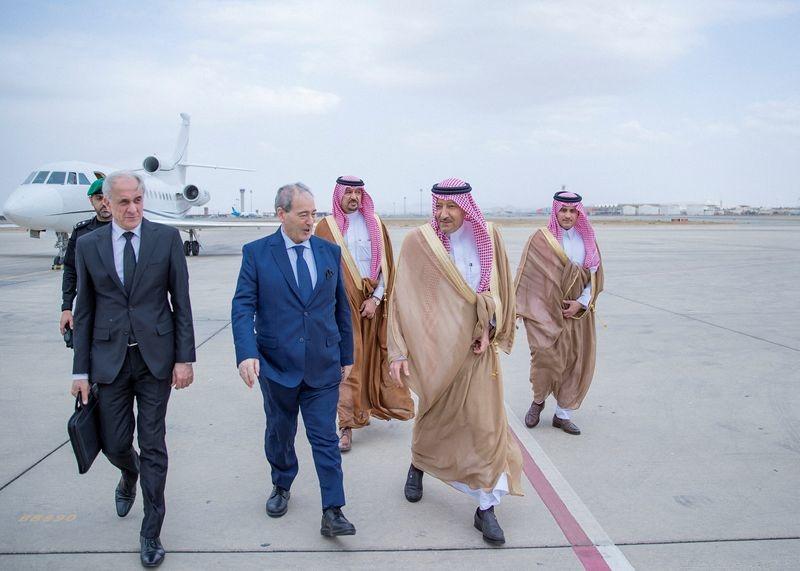Experts hail resumption of Riyadh-Damascus diplomacy as path to Mideast peace, prosperity
 Saudi Arabia’s Deputy Foreign Minister Waleed al-Khuraiji (second from right) receives Syrian Foreign Minister Faisal Mekdad (fourth from right) upon his arrival in Jeddah on April 12. (PHOTO / SPA / AFP)
Saudi Arabia’s Deputy Foreign Minister Waleed al-Khuraiji (second from right) receives Syrian Foreign Minister Faisal Mekdad (fourth from right) upon his arrival in Jeddah on April 12. (PHOTO / SPA / AFP)
With Riyadh and Damascus having resumed their diplomatic missions, just days after Syria’s reinstatement into the Arab League, there is a clear path toward stability in the region, analysts said, noting that the thaw in ties was built on the China-brokered deal between Saudi Arabia and Iran in March.
The Riyadh-Damascus rapprochement is set to influence the broader Middle East peace process and fulfill the economic ambitions of the countries in the region, the experts added.
On May 9, the Syrian Foreign Ministry announced the resumption of its diplomatic mission in Saudi Arabia following a mutual move from the kingdom, Xinhua News Agency reported.
The Syrian Foreign Ministry announced on April 12 that Syria and Saudi Arabia had agreed to resume consular services and air flights between the two countries following Syrian Foreign Minister Faisal Mekdad’s visit to Riyadh — the first such trip since 2011.
Clemens Chay, a research fellow at the Middle East Institute at the National University of Singapore, said that Riyadh “will look to claim another diplomatic win” after the one that it had scored when the recent China-brokered Saudi-Iran deal was reached in March.
Chay added that he believes this will not stop Riyadh from approaching these issues as a realist with Syrian President Bashar al-Assad’s government despite seeking gains from the resumption of diplomatic ties.
Mohammad Salami, an associate researcher at the International Institute for Global Strategic Analysis in Islamabad, Pakistan, said that Assad “needed Saudi Arabia to end its isolation from the Arab world” but Riyadh needs Damascus, too.
“Syria is a main pillar in the development of Palestine and Lebanon, so the move was a two-way street. Without it, Saudi Arabia cannot complete the issue of peace in the Middle East and, on top of that, the possible future peace with Israel,” he added.
On May 7, Syria was re-admitted into the 22-member Arab League. It was suspended in 2011 after the government’s crackdown on mass demonstrations in the country.
Henelito Sevilla Jr, dean and professor of the Asian Center at the University of the Philippines, said that the expulsion of Syria from the Arab League did not serve its purpose of either changing the regime in Syria or the policy behavior of Assad’s government.
“The expulsion resulted in the inability of the members of the Arab League to monitor Syrian activities … given that Syria after expulsion may no longer be obliged to follow the guiding principles of the member states,” said Sevilla.
“The reacceptance of Syria has to do with the rapprochement recently of Saudi Arabia and Iran, hence, Saudi’s role was very critical in winning back Syria in the League,” he added.
Mehmet Rakipoglu, a Gulf analyst and coordinator of academic studies at Dimensions for Strategic Studies, a think tank based in London, United Kingdom, noted that the decision will have not been easy for some members.
Not all in the Arab bloc, like Qatar and Kuwait, may agree with normalizing relations with Assad, but the consensus sees Assad as part of Syria’s future, he said.
“(The Arab League) sees Assad as one of the actors in the future of Syria that’s why they try to engage with the regime,” said Rakipoglu.
He added that there is competition between the regional countries, noting it was the UAE that normalized relations with Assad first in 2018 “in an economic way”.
Rakipoglu added Saudi Arabia may face some pressure from the United States, which was against any normalization efforts.
“I do think that the Saudi role makes a difference. The kingdom has an interest in being a leader in the Arab region and will help push other Gulf states to follow its steps. But I am concerned about the American role which may hinder the process,” said Khaled Almasri, a former dean of the Faculty of International Relations and Diplomacy at Al-Sham Private University in Damascus.
“China can play a constructive role by supporting the process of normalization with the Syrian government. It is going to need some time to (see the results),” he added.


